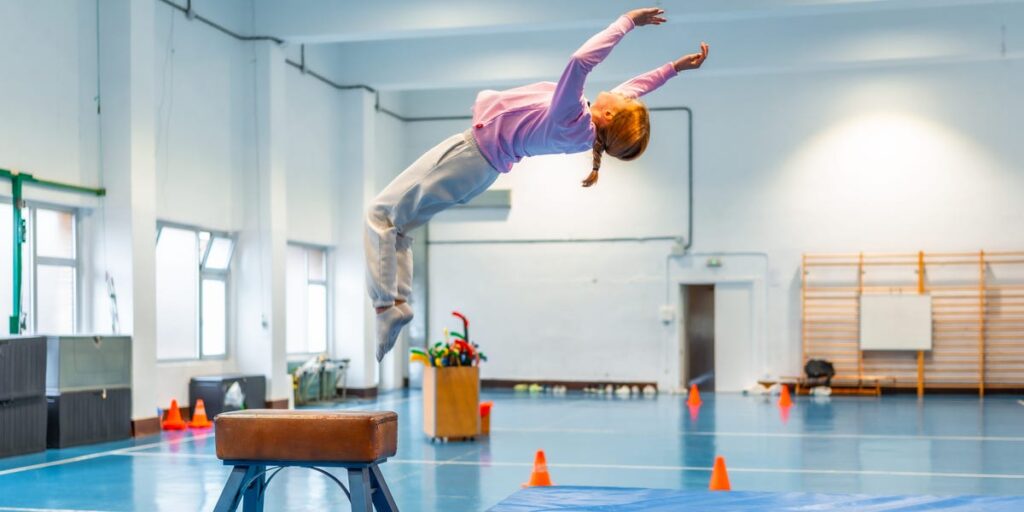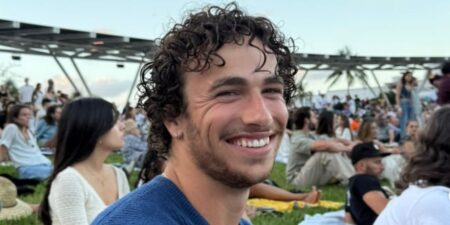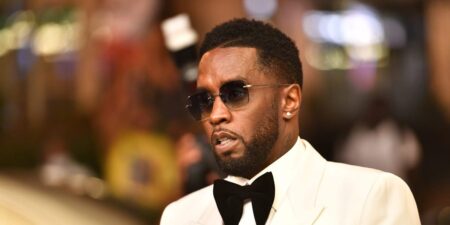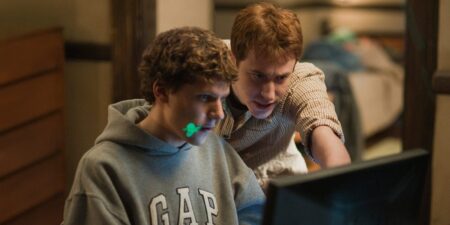During my junior year of high school, I was taking two narcotic painkillers every four hours between classes.
In my first year of full-time employment as a young worker, I had to take a month off for an emergency spine surgery.
I then had five unmedicated childbirths — not because I wanted to, but because I couldn’t get epidurals.
These are just a few of the extensive ways a childhood sports injury as a gymnast has impacted my life. So, when it came to signing up my own kids for sports, I had some serious hesitations.
My childhood in gymnastics was riddled with injuries
Like many young athletes, I was hell-bent on being an Olympian. By age 10, practice was around 25 hours a week, with more in the summer. I was an (almost) elite gymnast, constantly stunting my own progress with injuries. By the time I was a preteen, I had more than a dozen broken bones. I had my first back surgery at age 14, the result of herniated discs from the sport.
But, to me, it was all worth it because I dreamed of being an athlete. I convinced myself this was how I had to get there.
I’m only now understanding how significantly my childhood was affected. I have a glimpse of celebrating a family party at a steakhouse, except I was in so much pain I had to lie down in the corner on the floor. I learned to ask the host at a restaurant early on for a booth, eventually coming up with the go-to joke that I have an “old lady back.” I became closer to my physical therapists than some of my teachers. I got very used to attending sports events as the injured teammate, cheering on my team while I recovered.
The injuries have had lifelong effects
Since those years, I’ve had three successful back surgeries, but I’m left with daily pain and a rigorous set of accommodations — from needing to go on 10-minute walks after every sitting hour to not missing more than a day of exercise and PT. I do all of this to ensure my chronic pain doesn’t spiral out of control. I’ve seen dozens of specialists, tried all the alternative therapies, and taken way too much Advil.
I fully understood the extent of the scar tissue and damage when I attempted an epidural with my first childbirth, and found out the severe effects for me. I was in screaming pain, and then couldn’t walk for around six weeks postpartum with my brand new baby.
I regretted ignoring every plea from my doctors and parents to slow down, take it easy, or take a break. It was like telling a teen in love they couldn’t see somebody they were infatuated with. It never would have happened.
I don’t know how to deal with my kids’ interests in sports
My husband, a former college football player, also strongly believes in the value of sports for our kids. Now, ages 2 to 10, they are attracted to the competition, the friendships built on the sports field, and the personal drive it takes to improve at a sport.
I face a difficult decision as my kids ask each year to re-enroll in sports like football, lacrosse, baseball, and basketball — some riskier than others. And yet, I do not have it in me to tell them they cannot pursue a sport they love.
I’m intent on not putting my own childhood and medical trauma on them, as it seems just as bad as the sideline parents living vicariously through their kids’ sports glory. That puts me somewhere in the middle: a worried onlooker, praying they don’t injure themselves for life, but hell bent on not holding them back.
If they get injured, I wonder how I will deal with it. Will I be able to tell them no to returning to a sport if they sustain a more serious injury? Or have I learned some of the biggest lessons in my life from working back after defeat and setbacks? Are there other ways for them to learn these things without ruining their bodies?
I’m teaching them to listen to their bodies instead
For now, I focus on vocalizing to them how my life has been affected by not knowing when to stop and demonstrating to them how I am better at that now.
“Oh, my knee is getting sore, so I think I’ll cut this walk a bit short,” I tell them. I also share stories from my childhood of injuries and when I should have listened better to my body, but didn’t.
When a coach tells them after a fall to “shake it off” or “jump back in,” I try to teach them instead to take a second to check in with themselves. I teach them to ask themselves: Do I feel good enough to go back in? Am I shaken up or actually hurt?
In the end, I know that if they can ask themselves, “What’s best for my mind and body,” ahead of everything else, they will be OK regardless of what their future holds.
Read the full article here
















